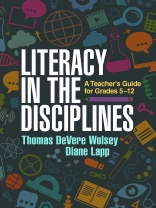This book gives all teachers in grades 5-12 practical strategies for building the unique literacy skills that students need for success in their respective subject areas. Drawing from interviews with leading educators and professionals in science, mathematics, history, the arts, and other disciplines, the authors explain what disciplinary literacy is and discuss ways to teach close reading of complex texts, discipline-specific argumentation skills, academic vocabulary, the use of multimodal tools and graphic organizers, and more. User-friendly features include classroom materials, lesson plans, practice activities, and recommended online teaching videos. Purchasers get access to a Web page where they can download and print the book’s 20 reproducible forms in a convenient 8 1/2′ x 11′ size.
Tabela de Conteúdo
I. The Literacy of the Disciplines 1. What Is Disciplinary Literacy? 2. What Are the Literacy Demands of Experts in the Disciplines?: Talking with Scientists, Historians, Mathematicians, Authors of Fiction, Musicians, Artists, Athletes, and Technical Experts II. Literacy Instruction in the Disciplines 3. Saying It Well: Instruction That Supports Academic Language Development in the Disciplines 4. Choosing the Right Words: Instruction That Supports Academic Vocabulary Use in the Disciplines 5. Arguing It Well: Instruction That Supports Communication in the Disciplines 6. Reading It Carefully: Instruction That Supports Reading in the Disciplines 7. Reading It Closely: Instruction That Supports Close Reading in the Disciplines 8. Writing It Down: Instruction That Supports Writing in the Disciplines III. Routines That Support Learning in the Disciplines 9. Organizing It Well: Using Graphic Organizers in the Disciplines 10. Presenting It Well: Using Multimodal Tools in the Disciplines 11. Conclusion: Looking Forward
Sobre o autor
Thomas De Vere Wolsey, Ed D, teaches online courses at Portland State University and elsewhere and is the founder of a consulting firm, the Institute to Advance International Education. Previously he worked in public schools for 20 years teaching English and social studies. His research explores how language informs thinking about content and how the interactions of students in digital and face-to-face environments change their learning. Dr. Wolsey is also interested in the intersections of traditional literacies with digital literacies, specifically focusing on how those literacies affect teacher preparation and professional development. Diane Lapp, Ed D, is Distinguished Professor of Education in the Department of Teacher Education at San Diego State University. She has taught elementary, middle, and high school and serves as Director of Learning at Health Sciences High and Middle College. Her research and instruction focus on issues related to struggling readers and writers who live in economically deprived urban settings, and their families and teachers. Widely published, Dr. Lapp has received the Outstanding Teacher Educator of the Year Award from the International Literacy Association, among other honors, and is a member of both the International Reading Hall of Fame and the California Reading Hall of Fame.












